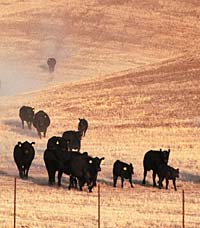Texas' brucellosis-infected herds: zero
|
Texas cattle producers started the new year with a big zero, and livestock health officials say it's cause for celebration and strengthened resolve to keep it that way.  "For the first time in the 50-plus-year battle against cattle brucellosis, none of Texas' 153,000 cattle herds are under quarantine," said Dr. Terry Conger, state epidemiologist for the Texas Animal Health Commission. Dr. Conger said this brings the state a giant step closer to wiping out the bacterial infection that struck more than 8,300 cattle herds in the state during the past 14 years. More than 20,000 Texas cattle herds were infected in the mid-1950s, when brucellosis eradication efforts were initiated. Dr. Max Coats, who heads the commission's field operations, said, "In the past 12 months, we found six infected herds—one each in Panola, Henderson, Orange, Medina, San Patricio, and Navarro counties. These herds were depopulated, and the owners received an indemnification for their animals, from a combination of state and federal funds, and the slaughter value of animals." Dr. Conger, a 25-year veteran of brucellosis eradication, said, "I don't know how long Texas will stay at zero quarantined herds, since we're actively testing and looking for those last hard-to-find infected herds. "Now is the most important time to be vigilant for this disease." He predicted that several infected herds will be found before the state will qualify for the "free" classification by having no infection for 12 months. Dr. Coats said, "Our progress can be directly credited to producer cooperation and the testing team comprised of Texas Animal Health Commission staff, US Department of Agriculture veterinarians, and private veterinary practitioners committed to this disease eradication program." He also gave kudos to the state-federal laboratory system, which runs more than 2.5 million blood and tissue samples yearly, and to the RB-51 vaccine, which provides protection against brucellosis but does not cause false-positive laboratory test results. Dr. Jon Lomme of USDA-APHIS Veterinary Services in Texas, which works closely with the Texas Animal Health Commission, said, "South Dakota has just achieved their victory over cattle brucellosis, joining the other 45 states classified as 'free' of the disease. Texas, Oklahoma, Missouri, and Florida are in the final stages of eradicating the disease."
| |